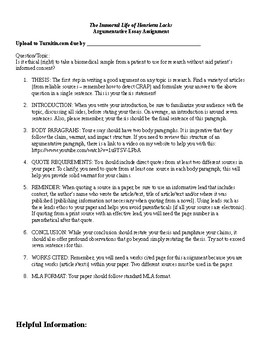

Winfrey is able to embody Deborah so genuinely, portraying despair, confusion, happiness and a range of emotions. While the film portrays scenes that are in the book, the medium of film allows for more feeling. The film misses out on Skloot’s intricate setup-with her plethora of scientific facts- for the film’s emotional rawness. This level of sentiment is lacking in the novel and is one of the things that makes the film worth watching. Her anguish makes it difficult for Rebecca to get her to open up, and there are many highly emotional moments between the two women.
#The immortal life of henrietta lacks essay movie#
Deborah appears deeply distressed throughout the majority of the movie because of the number of times her family has been taken advantage of. There is a lot less scientific background given in the film, which allows it to focus more on a human interest aspect. The HBO film is told purely through the journey of Rebecca (Rose Byrne) and Deborah (Oprah Winfrey), Henrietta Lacks’ daughter. Where the film lacks the contextualization that so greatly enhanced the book, it boasts an emotional dimension absent in Skloot’s work. This contextualization is crucial in presenting the kind of culture and racial tensions that existed in the world of scientific research at the time of Henrietta’s illness.

She makes sure to highlight the cases in which black people were treated inhumanely by researchers, an important aspect of ‘50s life to underline in light of the story’s many implications. This distinction is important because, while the Lacks family was taken advantage of in an ethical sense, they did not have a case that would hold up in a court of law. She also takes the time to meticulously set up the context of the medical business in what was a much less just time: She differentiates between the ethical and illegal standards amongst researchers. Before Skloot gets into too much detail about her contact with the Lacks family, she spends about half the novel explaining the history of the scientist, George Gey, who took the sample from Lacks and made HeLa cells so widely available. The novel begins with some basic information on cells and how Skloot, the author, became interested in HeLa cells-the epithet for Lacks’ cells-and the life of Lacks. While both film and novel portray Henrietta’s story in an enlightening way, the film cedes the book’s scientific rigor in favor of a more sentimental tone. In honor of Black History Month, it is important to recognize Lacks’ impact on science and discuss the portrayal of the Lacks family both on the page and on the screen. Her cells became the first line to survive indefinitely, allowing for consistency in results across labs, and helped perfect a cure for polio as well as many other important scientific discoveries. Starring Rose Byrne and Oprah Winfrey, the story analyzes the life of those related to Henrietta Lacks, a black woman who died of cervical cancer and whose cells were taken for research without consent. In 2017, HBO released a film based on the book “The Immortal Life of Henrietta Lacks” by Rebecca Skloot.


 0 kommentar(er)
0 kommentar(er)
